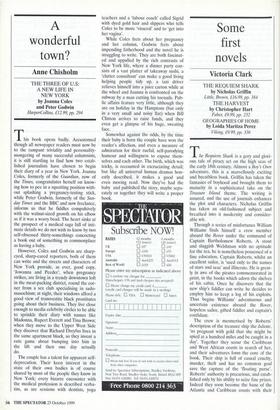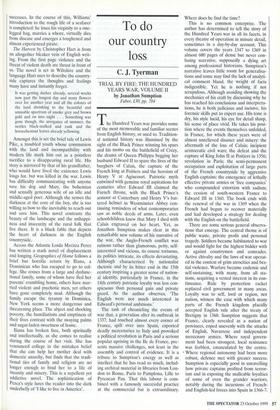Some first novels Victoria Clark
THE REQUIEM SHARK by Nicholas Griffin Little, Brown, £16.99, pp. 384 THE HARVEST by Christopher Hart Faber, £9.99, pp. 232 GEOGRAPHIES OF HOME by Loida Maritza Perez Viking, £9.99, pp. 336
The Requiem Shark is a gory and glori- ous tale of piracy set on the high seas of the early 18th century. Almost a Boy's Own adventure, this is a marvellously exciting and breathless book. Griffin has taken the fantasies of boyhood and brought them to maturity in a sophisticated take on the Treasure Island theme. The writing is assured, and the use of journals enhances the plot and characters, Nicholas Griffin has taken an old-fashioned subject and breathed into it modernity and consider- able wit.
Through a series of misfortunes William Williams finds himself a crew member aboard the Rover under the command of Captain Bartholomew Roberts. A stout and sluggish Welshman with no aptitude for the sea, he is nonetheless possessed of a fine education. Captain Roberts, whilst an excellent sailor, is 'used only to the names of stars and seas' and illiterate. He is great- ly in awe of the pirates commemorated in print, in the books which adorn the shelves of his cabin. Once he discovers that the new ship's fiddler can write he decides to employ him to keep a log of his exploits. Thus begins Williams' adventurous and uncertain existence aboard the Rover, hopeless sailor, gifted fiddler and captain's confidant.
The crew is mesmerised by Roberts' description of the treasure ship the Juliette. 'so pregnant with gold that she might be spied at a hundred miles and be caught in a day'. Together they scour the Caribbean and West African coasts in search of her, and their adventures form the core of the book. Their ship is full of casual cruelty, murder, theft and has no common goal save the capture of the 'floating purse'. Roberts' authority is precarious, and estab- lished only by his ability to seize fine prizes. Indeed they soon become the bane of the Atlantic and Caribbean coasts with their
successes. In the course of this, Williams' introduction to the rough life of a seafarer is completed: he loses his virginity to a one- legged hag, marries a whore, virtually dies from disease and emerges a toughened and almost experienced pirate.
The Harvest by Christopher Hart is from an altogether bleaker vein of English writ- ing. From the first page violence and the threat of violent death are thrust in front of us. The novel is set in Wiltshire and the language Hart uses to describe the country- side captures the thoughts and feelings many have and instantly forget.
It was getting darker already, several weeks now past the longest day and many flowers over for another year and all the colours of the land shrinking to the beautiful and unusable spectrum of smoke grey and brown gold and on into night . . . Something was gone though, the arrogance of summer, the nettles black-stalked and rank and the horsechestnut leaves already yellowing.
Amongst this is set the brief tale of Lewis Pike, a troubled youth whose communion with the land and incompatibility with modern life mark him out as a pointless sacrifice to a disappearing rural life. His story is mirrored by that of his grandfather, who would have lived the existence Lewis longs for. but was killed in the war. Lewis has difficulty communicating with anyone save his dog and Mary, the bohemian and sexually generous wife of an idle and middle-aged poet. Although she senses the darkness at the core of the boy, she is too willing to bow to the inevitable to reach out and save him. This novel contrasts the beauty of the landscape and the unhappi- ness and insecurity of the rural folk that live there It is a black fable that depicts the heart of darkness in the English countryside.
Across the Atlantic Loida Maritza Perez has written a stark novel of displacement and longing. Geographies of Home follows a brief but horrific return by Iliana, a Dominican who has escaped to go to col- lege. She comes from a large and dysfunc- tional family, some of whom have fled her parents' crumbling home, others have mar- ried violent and psychotic men, yet others have gone completely mad. Although the family escape the tyranny in Dominica, New York seems a more dangerous and threatening place. The abject and shocking Poverty, the humiliations and emptiness of their lives contrast with the swaying palms and sugar-laden sweetness of home.
Iliana has broken free, both spiritually and intellectually, as she comes to realise during the course of her visit. She has renounced college in the mistaken belief that she can help her mother deal with domestic anarchy, but finds that the tradi- tional ties of family and religion are no longer enough to bind her to a life of insanity and misery. This is a repellent yet addictive novel. The sophistication of Perez's style lures the reader into the dark underbelly of 'I like to live in America'.



















































































 Previous page
Previous page